- Home
- Barbara W. Tuchman
The Proud Tower: A Portrait of the World Before the War, 1890-1914 Page 3
The Proud Tower: A Portrait of the World Before the War, 1890-1914 Read online
Page 3
He did not believe in political equality. There was the multitude, he said, and there were “natural” leaders. “Always wealth, in some countries birth, in all countries intellectual power and culture mark out the man to whom, in a healthy state of feeling, a community looks to undertake its government.” These men had the leisure for it and the fortune, “so that the struggles for ambition are not defiled by the taint of sordid greed.… They are the aristocracy of a country in the original and best sense of the word.… The important point is, that the rulers of a country should be taken from among them,” and as a class they should retain that “political preponderance to which they have every right that superior fitness can confer.”
So sincere and certain was his conviction of that “superior fitness” that in 1867 when the Tory Government espoused the Second Reform Bill, which doubled the electorate and enfranchised workingmen in the towns, Salisbury at thirty-seven flung away Cabinet office within a year of first achieving it rather than be party to what he considered a betrayal and surrender of Conservative principles. His party’s reversal, engineered by Disraeli in a neat enterprise both to “dish the Whigs” and to meet political realities, was regarded with abhorrence by Lord Cranborne (as Lord Robert Cecil had then become, his elder brother having died in 1865). Though it might ruin his career he resigned as Secretary for India and in a bitter and serious speech spoke out in the House against the policy of the party’s leaders, Lord Derby and Mr. Disraeli. He begged the members not to do for political advantage what would ultimately destroy them as a class. “The wealth, the intelligence, the energy of the community, all that has given you that power which makes you so proud of your nation and which makes the deliberations of this House so important, will be numerically absolutely overmatched.” Issues would arise in which the interests of employers and employed would clash and could only be decided by political force, “and in that conflict of political force you are pitting an overwhelming number of employed against a hopeless minority of employers.” The outcome would “reduce to political insignificance and extinction the classes which have hitherto contributed so much to the greatness and prosperity of their country.”
A year later, on his father’s death, he entered the House of Lords as third Marquess of Salisbury. In 1895, after the passage of nearly thirty years, his principles had not shifted an inch. With no belief in change as improvement, nor faith in the future over the present, he dedicated himself with “grim acidity” to preserving the existing order. Believing that “rank, without the power of which it was originally the symbol, was a sham,” he was determined, while he lived and governed England, to resist further attack on the power of that class of which rank was still the visible symbol. Watchful of approaching enemies, he stood against the coming age. The pressures of democracy encircled, but had not yet closed in around, the figure whom Lord Curzon described as “that strange, powerful, inscrutable, brilliant, obstructive deadweight at the top.”
The average member of the ruling class, undisturbed by Lord Salisbury’s too-thoughtful, too-prescient mind, did not worry deeply about the future; the present was so delightful. The Age of Privilege, though assailed at many points and already cracking at some, still seemed, in the closing years of the Nineteenth Century and of Victoria’s reign, a permanent condition. To the privileged, life appeared “secure and comfortable.… Peace brooded over the land.” Undoubtedly Sir William Harcourt’s budget of 1894, enacted by the Liberals during the premiership of Lord Rosebery, Mr. Gladstone’s rather inappropriate successor, sent a tremor through many. It introduced death duties—and what was worse, introduced them on a graduated principle from 1 per cent on estates of £500 to 8 per cent on estates of over a million pounds. And it increased the income tax by a penny to eightpence in the pound. Although to soften the blow and equalize the burden it imposed a tax on beer and spirits so that the working class, who paid no income tax, would contribute to the revenue, this failed to muffle the drumbeat of the death duties. The eighth Duke of Devonshire was moved to predict a time which he “did not think can be deferred beyond the period of my own life” when great estates such as his of Chatsworth would be shut up solely because of “the inexorable necessities of democratic finance.”
But a greater, and from the Conservative point of view a happier, event of 1894 compensated for the budget. Mr. Gladstone retired from Parliament and from politics. His last octogenarian effort to force through Home Rule had been defeated in the House of Lords by a wrathful assembly of peers gathered for the purpose in numbers hardly before seen in their lifetime. He had split his party beyond recall, he was eighty-five, the end of a career had come. With the Conservative victory in the following year there was a general feeling, reflected by The Times, that Home Rule, that “germ planted by Mr. Gladstone in our political life which has threatened to poison the whole organism,” being now disposed of, at least for the present, England could settle down sensibly to peace and business. The “dominant influences” were safely in the saddle.
“Dominant influences” was a phrase, not of the Conservative-minded Times, but strangely enough of Mr. Gladstone himself, who was a member of the landed gentry and never forgot it nor ever abandoned the inborn sense that property is responsibility. He owned an estate of 7,000 acres at Hawarden with 2,500 tenants producing an annual rent roll between £10,000 and £12,000. In a letter to his grandson who would inherit it, the Great Radical urged him to regain lands lost through debt by earlier generations and restore Hawarden to its former rank as a “leading influence” in the county, because, as he said, “society cannot afford to dispense with its dominant influences.” No duke could have put it better. This was exactly the sentiment of the Conservative landowners, who were his bitterest opponents but with whom, at bottom, he shared a belief both in the “superior fitness” conferred by inherited ownership of land and in the country’s need of it. Their credo was the exact opposite of the idea prevailing in the more newly minted United States, that there was a peculiar extra virtue in being lowly born, that only the self-made carried the badge of ability and that men of easy circumstances were more likely than not to be stupid or wicked, if not both. The English, on the contrary, having evolved slowly through generations of government by the possessing class, assumed that prolonged retention by one family of education, comfort and social responsibility was natural nourishment of “superior fitness.”
It qualified them for government, considered in England as nowhere else the proper and highest profession of a gentleman. A private secretaryship to a ministerial uncle or other relative could be either a serious apprenticeship for Cabinet office or merely a genial occupation for a gentleman like Sir Schomberg McDonnell, Lord Salisbury’s Private Secretary, a brother of the Earl of Antrim. Diplomacy, too, offered a desirable career, often to persons of talent. The Marquess of Dufferin and Ava, when British Ambassador in Paris in 1895, taught himself Persian and noted in his diary for that year that besides reading eleven plays of Aristophanes in Greek, he had learned by heart 24,000 words from a Persian dictionary, “8,000 perfectly, 12,000 pretty well, and 4,000 imperfectly.” Military service in one of the elite regiments of Guards or Hussars or Lancers was an equally accepted role for men of wealth and rank, although it tended to attract the weaker minds. The less wealthy went into the Church and the Navy; the bar and journalism provided careers when earning power was a necessity. But Parliament above all was the natural and desirable sphere for the exercise of “superior fitness.” A seat in Parliament was the only way to a seat in the Cabinet, where power and influence and a membership in the Privy Council, and on retirement a peerage, were to be won. The Privy Council, made up of 235 leaders in all fields, though formal and ceremonial in function, was the badge of importance in the nation. A peerage was still the magic mantle that set a man apart from his fellows. Cabinet office was highly coveted and the object of intense maneuvering behind the scenes. When governments changed, nothing so absorbed the attention of British society as the complicat
ed minuet of Cabinet-making. Clubs and drawing rooms buzzed, cliques and alliances formed and reformed, and the winners emerged proudly wearing fortune’s crown of laurel. The prize required hard work and long hours, though rarely knowledge of the department. A minister’s function was not to do the work but to see that it got done, much as he managed his estate. Details such as decimal points, which Lord Randolph Churchill when Chancellor of the Exchequer shrugged aside as “those damned dots,” were not his concern.
The members of Lord Salisbury’s Government, of whom the majority, though not all, enjoyed inherited land, wealth or titles, had not entered government for material advantages. Indeed, from their point of view, it was right and necessary that public affairs should be administered, as Lord Salisbury said, by men unaffected “by the taint of sordid greed.” A parliamentary career—which was of course unsalaried—conferred, not gain, but distinction. The House of Commons was the center of the capital, of the Empire, of Society; its company was the best in the kingdom. Ambition led men there as well as duty; besides, it was the expected thing to do. Fathers in Parliament were followed by sons, both often serving at the same time. James Lowther, Deputy Speaker of the House from 1895 to 1905 and afterward Speaker, came from a family which had represented Westmorland constituencies more or less continuously over six centuries. His great-grandfather and grandfather each had sat for half a century and his father for twenty-five years. The representative of a county division in Parliament was usually someone whose home was known for seventy miles around as “The House,” whose family had been known in the district for several hundred years and the candidate himself since his birth. Since the cost of candidacy and election and of nursing a constituency afterward was borne by the member himself, the privilege of representing the people in Parliament was a luxury largely confined to the class that could afford it. Of the 670 members in the House of Commons in 1895, 420 were gentlemen of leisure, country squires, officers and barristers. Among them were twenty-three eldest sons of peers, besides their innumerable younger sons, brothers, cousins, nephews and uncles, including Lord Stanley, heir of the sixteenth Earl of Derby, who, after the Dukes, was the richest peer in England. As a junior Government Whip, Stanley was obliged to stand at the door of the Lobby and bully or cajole members to be on hand for a division, though himself not allowed inside the chamber while performing this duty. It was as if he were, wrote an observer, “an Upper Class Servant.” To see “this heir to a great and historic name and a vast fortune doing work almost menial” was testimony both to a sense of political duty and the allure of a political career.
The ruling class did not grow rulers only. It produced the same proportion as any other class of the unfit and misfit, the bad or merely stupid. Besides prime ministers and empire-builders it had its bounders and club bores, its effete Reggies and Algies caricatured in Punch discussing their waistcoats and neckwear, its long-legged Guardsmen whose conversation was confined to “haw, haw,” its wastrels who ruined themselves through drink, racing and cards, as well as its normal quota of the mediocre who never did anything noticeable, either good or bad. Even Eton had its “scugs,” boys who, in the words of an Etonian, were “simply not good form … and if not naturally vicious, certainly imbecile, probably degenerate.” Though a scug at Eton—not to be confused with “swat,” or grind—could as often as not turn out to be a Privy Councillor thirty years later, some were scugs for life. One of Lord Salisbury’s nephews, Cecil Balfour, disappeared to Australia, over an affair of a forged check, and died there, it was said, of drink.
Despite such accidents, the ruling families had no doubts of their inborn right to govern and, on the whole, neither did the rest of the country. To be a lord, wrote a particularly picturesque exemplar, Lord Ribblesdale, in 1895, “is still a popular thing.” Known as the “Ancestor” because of his Regency appearance, Ribblesdale was so handsome a personification of the patrician that John Singer Sargent, glorifier of the class and type, asked to paint him. Standing at full length in the portrait, dressed as Master of the Queen’s Buckhounds in long riding coat, top hat, glistening boots and holding a coiled hunting whip, Sargent’s Ribblesdale stared out upon the world in an attitude of such natural arrogance, elegance and self-confidence as no man of a later day would ever achieve. When the picture was exhibited at the Salon in Paris and Ribblesdale went to see it, he was followed from room to room by admiring French crowds who, recognizing the subject of the portrait, pointed out to each other in whispers “ce grand diable de milord anglais.”
At the opening of Ascot Race Week when Lord Ribblesdale led the Royal Procession down the green turf, mounted on a bright chestnut against a blue June sky, wearing a dark-green coat with golden hound-couplings hanging from a gold belt, he made a sight that no one who saw it could ever forget. As Liberal Whip in the House of Lords, an active member of the London County Council and chief trustee of the National Gallery, he too took his share of government. Like most of his kind he had a sense of easy communion with the land-based working class who served the sports and estates of the gentry. When the Queen presented J. Miles, a groom of the Buckhounds, with a medal in honor of fifty years’ service, Ribblesdale rode over from Windsor to congratulate him and stayed “for tea and a talk” with Mrs. Miles. As he himself wrote of the average nobleman, “the ease of his circumstances from his youth up tends to produce a good-humored attitude.… To be pleased with yourself may be selfish or it may be stupid, but it is seldom actively disagreeable and usually it is very much the reverse.” Despite a tendency of the Liberal press to portray the peerage as characterized “to a melancholy degree by knock-knees and receding foreheads,” the peer still retained, Ribblesdale thought, the respect of his county. Identifying himself with its interests and affairs, maintaining mutually kindly relations toward his tenants, cottagers and the tradesmen of his market town, he would have to seriously misconduct himself before he would “outrun the prestige of an old name and tried associations.” Yet for all this comfortable picture, Ribblesdale too heard the distant rumble and thirty years later chose for the motto of his memoirs the claim of Chateaubriand: “I have guarded that strong love of liberty peculiar to an aristocracy whose last hour has sounded.”
Midsummer was the time when the London season was at its height and Society disported and displayed itself in full glory. To a titled visitor from Paris it seemed as if “a race of gods and goddesses descended from Olympus upon England in June and July.” They appeared “to live upon a golden cloud, spending their riches as indolently and naturally as the leaves grow green.” In the wake of the Prince of Wales followed a “flotilla of white swans, their long necks supporting delicate jewelled heads,” who went by the names of Lady Glenconner, the Duchess of Leinster and Lady Warwick. The Duchess, who died young in the eighties, was, in the words of Lord Ernest Hamilton, “divinely tall,… of a beauty so dazzling as to be almost unbelievable.” Her successor, the Countess of Warwick, “the prettiest married woman in London,” was inamorata of the Prince of Wales and the cause of a famous fracas in which Lord Charles Beresford almost struck his future sovereign. She shimmered before the eyes of a Society journal as “a goddess with a rounded figure, diaphanously draped, and a brilliant haughty beautiful countenance whose fame had penetrated to the dim recesses of the placid country.” She was a Beauty, a magic title of the time that conferred upon its bearer a public character. “Get up, Daisy,” cried her mother when their ship docked after a particularly seasick crossing of the Irish Channel which had left her prostrate, “the crowd is waiting to have a look at you.”
In and out of Adam doorways in Berkeley and Belgrave Squares the constant procession flowed. No one unless dying ever stayed home. The day began at ten with a gallop in the Park and ended at a ball at three in the morning. At a select spot between the Albert and Grosvenor Gates in Hyde Park, a small circle of all the Society that counted was sure of meeting its members on a morning ride or a late afternoon drive between tea and dinner. London had not lost her
Georgian air. Window boxes were bright with flowers in houses and squares lived in by the families whose names they bore: Devonshire House and Lansdowne House, Grosvenor Square and Cadogan Place. Splendid equipages filled the streets. Ladies driving their victorias, with a “tiger” sitting very straight with folded arms in the box, gave an extra flick of the whip to their high-stepping cobs as they passed under approving masculine gaze from club windows. Gentlemen sighed and told each other “what a pretty thing it was to see a lovely woman drive in London behind a well-matched pair.” Down another street came trotting the Royal Horse Guards in scarlet tunics and white breeches on black horses with bridles and halter-chains shining and jingling. Tall silhouettes of hansom cabs carried the well-known profiles of statesmen and clubmen on their round of visits to the great houses and to the clubs in Pall Mall and Piccadilly: the Carlton for Conservatives, the Reform for Liberals, the Athenaeum for distinction, the Turf for sportsmen, the Travellers’ or White’s, Brooks’s or Boodle’s for social converse with like-minded gentlemen. The business of government and empire went on in “the best club in London,” the House of Commons, which sat through the season. Its library, smoking room and dining room, its servants, waiters and wine cellars were of a quality befitting the profession of a gentleman. Ladies in wide hats and trailing skirts took tea with members and ministers on the terrace overhanging the Thames where they could look out on the episcopal dignity of Lambeth Palace across the river and gossip about political preferment.
At private dinner tables draped in smilax, with a footman behind each chair, gentlemen in white tie and tails conversed with ladies in clouds of tulle over bare shoulders, wearing stars or coronets in their elaborately piled hair. Conversation was not casual but an art “in which competence conferred prestige.” At the opera, made fashionable by its most energetic patroness, Lady de Grey, Nellie Melba sang love duets in her pure angelic soprano with the handsome idol Jean de Reszke. In the Royal Box glowed a vision in low-cut velvet, Lady Warwick, with “only a few diamonds on her Mephistophelian scarlet dress” and a scarlet aigrette in her hair. A battle array of lorgnettes was raised to see what Lady de Grey, her rival as London’s best-dressed woman, was wearing. Afterwards at Lady de Grey’s parties, called “Bohemia in tiaras,” the guests might include Mme Melba herself and the Prince of Wales and—before his fatal year of 1895—Oscar Wilde. Every night there were political receptions lasting till midnight or dances continuing until dawn. At the top of a sweeping curve of staircase the Duchess of Devonshire or Lady Londonderry, the two arbiters of Society, glittering in diamonds, received a brilliant stream of guests while a major-domo in a stentorian orgy of titles announced, “His Grace … Her Highness … The Right Honorable … Lord and Lady … His Excellency the Ambassador of …” and down in the lamplit square a footman bellowed for some departing Lordship’s carriage.

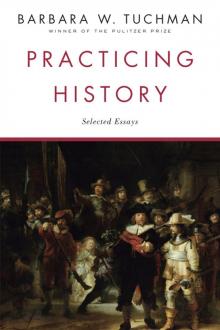 Practicing History: Selected Essays
Practicing History: Selected Essays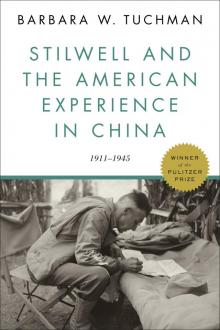 Stilwell and the American Experience in China, 1911-45
Stilwell and the American Experience in China, 1911-45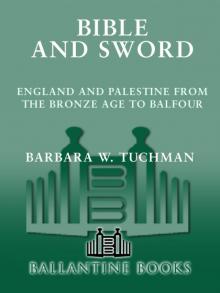 Bible and Sword: England and Palestine From the Bronze Age to Balfour
Bible and Sword: England and Palestine From the Bronze Age to Balfour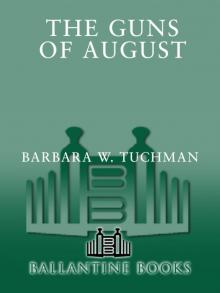 The Guns of August
The Guns of August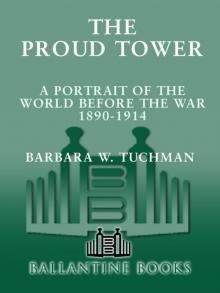 The Proud Tower: A Portrait of the World Before the War, 1890-1914
The Proud Tower: A Portrait of the World Before the War, 1890-1914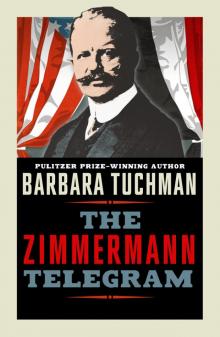 The Zimmermann Telegram
The Zimmermann Telegram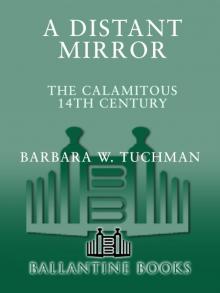 A Distant Mirror: The Calamitous 14th Century
A Distant Mirror: The Calamitous 14th Century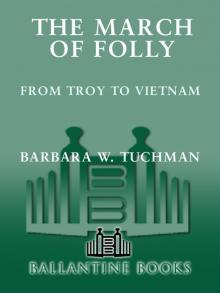 The March of Folly: From Troy to Vietnam
The March of Folly: From Troy to Vietnam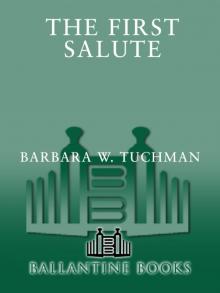 The First Salute
The First Salute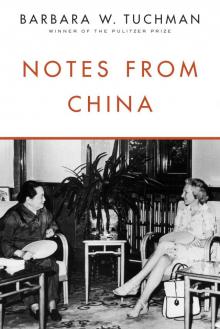 Notes From China
Notes From China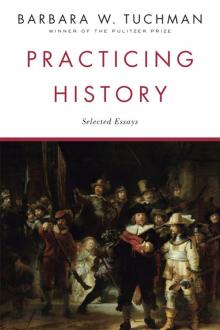 Practicing History
Practicing History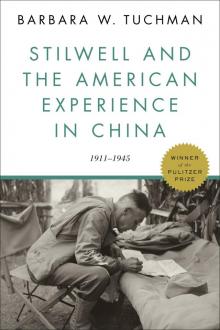 Stilwell and the American Experience in China
Stilwell and the American Experience in China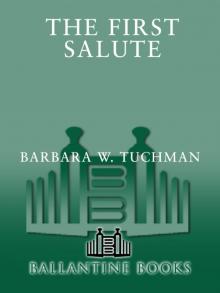 First Salute
First Salute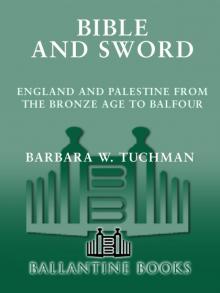 Bible and Sword
Bible and Sword